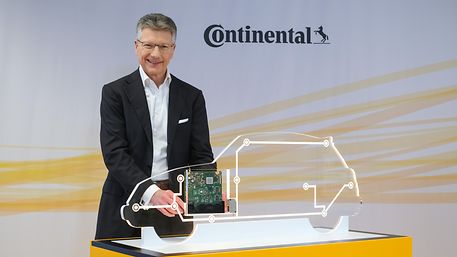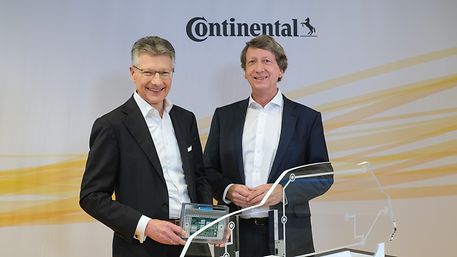Focuses on a Healthy Mobility Ecosystem
In a sharply deteriorating market environment, Continental achieved its adjusted targets for fiscal 2019, as the technology company announced recently at its annual press conference in Hanover. According to preliminary figures, the DAX company’s sales in the past fiscal year was €44.5 billion (2018: €44.4 billion), while the adjusted EBIT margin was 7.4 percent (2018: 9.3 percent). That corresponded to an adjusted operating result of €3.2 billion (2018: €4.1 billion). While global automotive production declined by about 6 percent in 2019 according to the latest estimates, Continental’s organic sales development in the same period was down 2.6 percent, thus outperforming its markets.
At the same time – as reported at the end of October 2019 – diminished market expectations in particular required non-cash write-downs in the amount of €2.5 billion. The impairment testing of recognized goodwill as required by accounting standards led to a reported operating result of -€268 million (2018: €4.0 billion) and net income of -€1.2 billion (2018: €2.9 billion).
Despite challenging conditions and a high level of capital expenditure, Continental achieved sound cash inflow before financing activities in the past fiscal year. Free cash flow before acquisitions and the effects of transforming the powertrain division into an independent legal entity amounted to €1.3 billion.
With this basis and in view of Continental’s strong and healthy balance sheet structure, the Executive Board is proposing a dividend of €4.00 (2018: €4.75) per share for fiscal 2019.
Looking back over the past year, Continental’s Chairman of the Executive Board, Dr. Elmar Degenhart, said: “Continental continues to outperform its markets even in challenging times. Last year the entire automotive industry suffered a clear downturn. In operational terms we put in a respectable performance overall, but ultimately the 2019 result, particularly in the automotive business, was not satisfactory.” At the same time, he pointed out that, in a challenging situation, the dividend proposed to shareholders is only slightly lower than last year’s.

Market outlook 2020: global passenger car production to decline for a third successive year
For 2020, Continental does not anticipate any recovery in the economic environment. The company expects global production of passenger cars and light commercial vehicles in 2020 to decrease for the third year in a row. It is likely to decline by 2 to 5 percent year-on-year. These estimates take into account the impact of the coronavirus on production volumes, as can be determined to date. Continental currently expects global production to decrease by more than 10 percent year-on-year in the first three months of this fiscal year. In China, the decrease is likely to be at least 30 percent in this period. The market forecast does not include possible further disruptions to production and the supply chain as well as demand as a result of the continuing spread of the coronavirus. Such disruptions cannot be gauged at the current time.
“The economic environment will remain challenging in 2020. In addition to the declines in production, the globally interconnected automotive industry will be impacted by turbulence arising from the coronavirus epidemic, trade conflicts that remain unresolved, drastically more stringent emission regulations in Europe and the rapid digitalization of business processes and products” explained Wolfgang Schäfer, Continental’s CFO.
Guidance for 2020: declining sales growth in shrinking markets
The 2020 fiscal year got off to a subdued start, as expected, owing to continuing market uncertainty. On the basis of assumptions about trends in its markets and industries, Continental anticipates consolidated sales for 2020 of around €42.5 to €44.5 billion and an adjusted EBIT margin of around 5.5 to 6.5 percent. Sales in the new Automotive Technologies group sector together with the former Powertrain division are expected to amount to around €25.5 to €26.5 billion, with an adjusted EBIT margin of around 3 to 4 percent. Sales in the Rubber Technologies group sector are forecast to total around €17 to €18 billion, with an adjusted EBIT margin of around 10 to 11 percent.

Transformation 2019–2029 structural program: assessment of additional measures
The Transformation 2019–2029 structural program is Continental’s answer to the global decline in the automotive industry, the disruptive technological transition in the drive system sector, and the ever swifter digitalization of products and business processes. “2020 will be a transition year in our structural transformation. Our structural program and our new organizational structure will bring significant progress in the medium term,” said Degenhart.
At the same time, he pointed to the deterioration in the global economic environment that has occurred since the structural program was announced in September 2019. The absolute decrease in the production of passenger cars and light commercial vehicles has now reached the level seen in the crisis years of 2008/09. This is being worsened further by the current spreading of the coronavirus and the corresponding reduction in production in China.
“The uncertainty in the industries that are relevant for us is growing rapidly. An economic recovery will take longer than anticipated. That is why we are currently looking into how we can effectively respond to a weakening overall situation and its impact in the medium term, with further measures that go beyond our current structural program. Above all, we are at present pursuing two goals that are crucial for our success: continuously rising productivity and our sustainable competitiveness” said the CEO. As matters currently stand, the company expects to have initial findings from this process in May 2020 and will provide further information in due course.
Continental referred to the possibility of additional adjustments when it announced its structural program at the end of September 2019, and did not rule out further projects if the effect of the measures defined at the time turned out to be insufficient to achieve the profit targets set.
Degenhart: “Continental made the necessary preparations at an early stage to weather the uncertainties ahead” With regard to the medium and long-term challenges facing the global automotive industry, Degenhart is confident: “Continental and its industries are currently undergoing a profound transformation. It affects everything that makes up our business, from products and processes to business models and structures. We are facing major challenges; but what I see above all for Continental are enormous opportunities.” Continental has, he said, established a sound technological position and strong balance sheet at an early stage. “We are much better prepared for difficult conditions than we were before the last downturn in the automotive industry. We have a clear plan for our future success,” said Degenhart.
Focus on profitable growth areas
A significant part of this plan consists of focusing all efforts on strengthening profitable growth areas. These include assisted, automated and connected driving; the implementation of new vehicle architectures and connectivity of cars with the help of new, high-performance computers; the business with software and data based on intelligent products made of plastic, rubber or electronics; as well as the industrial and end-customer business. The clear priority for the deployment of capital is profitable growth. This goes hand in hand with a further strengthening of the corporate culture. The key elements of this will be Continental’s company values, increasingly decentralized decision-making responsibility and future-oriented employee training. “Suppliers like Continental make an important contribution to a healthy mobility ecosystem that offers protection to the environmental, economic and social climate all at once,” said Degenhart.
Continental is continuing to invest heavily in the mobility of the future
In the last fiscal year, Continental continued to undertake a high level of capital expenditure. “We are investing billions in the mobility of tomorrow. Only a small number of companies around the world can do that in these challenging times. At the same time, we have substantially stepped up our cost discipline in all areas,” explained CFO Wolfgang Schäfer.
In fiscal 2019 alone, Continental invested around €6.7 billion (2018: €6.3 billion) in research and development, as well as in property, plant and equipment, and software.
Continental is in a solid financial position
As of December 31, 2019, Continental’s liquidity reserves totalled €8.0 billion (2018: €6.3 billion), consisting of cash and cash equivalents of €3.3 billion (2018: €2.8 billion) and committed, unutilized credit lines of €4.7 billion (2018: €3.5 billion). “Continental has solid finances. So we are well prepared for the coming years,” said Schäfer, adding: “In 2019 we achieved very good terms for our four bond issues and our revolving credit line. The improvements are the result and a further reflection of our fundamentally solid balance sheet structure.” Continental is one of the first companies in the industry to incorporate into its new revolving credit line criteria that reward sustainable business practices.